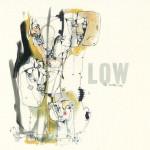
Low The Invisible Way
(Sub Pop)
Low do not attribute their longevity to their dauntless work ethic. You’d think that part of what keeps them going must be for very mature reasons – a search for sustainability in a business that is anything but sustainable, a necessity to provide to their children, or simply the routine of doing their job because they excel at it. During their twenty-year run, they’ve endured many significant periods in rock history without altering their set path: the rise and fall of grunge, the turn-of-the-century teen bop boom, and the ever-increasing prominence of electronic music in the separatist, all-things-indie diaspora. And yet, they’ve remained a precious, rare class act, constantly redefining themselves in very quiet ways without receiving the sort of attention that could disrupt their creative intent. As their rather unpresumptuous modus operandi goes – “slow, quiet, sometimes melancholy, and we hope, sometimes pretty…”
The Duluth, Minnesota trio’s “slowcore” sound remains inimitable and, more surprising, vital, even if they’ve allayed some of the somber, funereal depths that marked most of their nineties input. If their signing with Sub Pop was kind of an accidental saving grace, just as they were becoming a decayed, “dinosaur act” in some corners, it also brought a small measure of skepticism as to how they would evolve for their second act. The quaint, experimental touches have been mostly hit-and-miss – the aptly titled Great Destroyer demolished their flaccid, thin walls with brooding, forceful guitar leads that, at times, had them trying to keep up with the pace. To which they followed with the masterful Drums & Guns, which still stands as a distressing meditation on war and resistance that brought the chills with each clattering sound tick and clanging percussion.
If their last release, C’Mon, felt more like an encapsulation of all their efforts, then The Invisible Way finds them coming back full circle like clockwork. The warm, earthy Plastic Cup offers a subtle piano hook over gentle chord changes, as lead singer Alan Sparhawk cheekily ruminates over how life events come and go in the course of time, but will never outlive the material; he uses a pissed cup as a synecdoche, and envisions it as a dug up treasure that archeologists will examine with awe. It’s instantly familiar, but not exactly comparable to anything they’ve ever done, and will inform the album’s barren, old west atmosphere. That eased up, slow as molasses approach makes a welcome return in Holy Ghost, in which Mimi Parker’s affecting register flows over a gorgeous, folk-tinged melody. She unleashes pent up emotions over those we preserve in our memory after their passing: ‘I feel the hands/But I don’t see anyone/It’s there and gone.’
The Invisible Way tackles both serious and lighthearted subjects, and Low make sure to always render these with a powerful release. They’ve always had a flair for the dramatic, which benefits the restraint at hand in a track like So Blue, in which an exultant Parker sustains the words over long stretches alongside a minimal piano that soars into the blue. On the other hand, the calm brush strokes and lumbering piano accompaniment of Amethyst foretells a storm that’s drawing near, a female protagonist bound with fear: ‘You claim they can’t touch you/still you choose to take the edge of the room’; the amethyst stone serves as a symbol of protection, which Egyptians historically used to guard themselves against guilty or fearful feelings. But they reach a pleasure center when they’re at their most optimistic, like in Just Make it Stop, again showcasing a euphoric Parker conveying the simple message of heartbreak with a rising cadence.
Hiring Jeff Tweedy to helm The Invisible Way takes Low into a slightly new direction, but still finds them at a happy confluence of beauty and drabness that shows their strengths as versatile, low-key performers. He does inject some of that rootsy DNA into their spacious, acoustic-based arrangements – not to mention the discernible presence of the piano, which they relentlessly pulverize like it’s no one’s business - and does so without limiting some of their riffy, looser moments. That natural, intriguing warmth does shine throughout with a sheen that sticks too sickly-sweet, and the honky-tonk turned droning guitar attack of On My Own is more of a distraction, but it doesn’t derail too much from the album’s overarching mood. All the same, they make enough changes while doing what they do best to avoid getting pigeonholed, which is more than we can ask for from a band that’s about to start a third milestone. That, in itself, is a means for celebration.
20 March, 2013 - 05:46 — Juan Edgardo Rodriguez